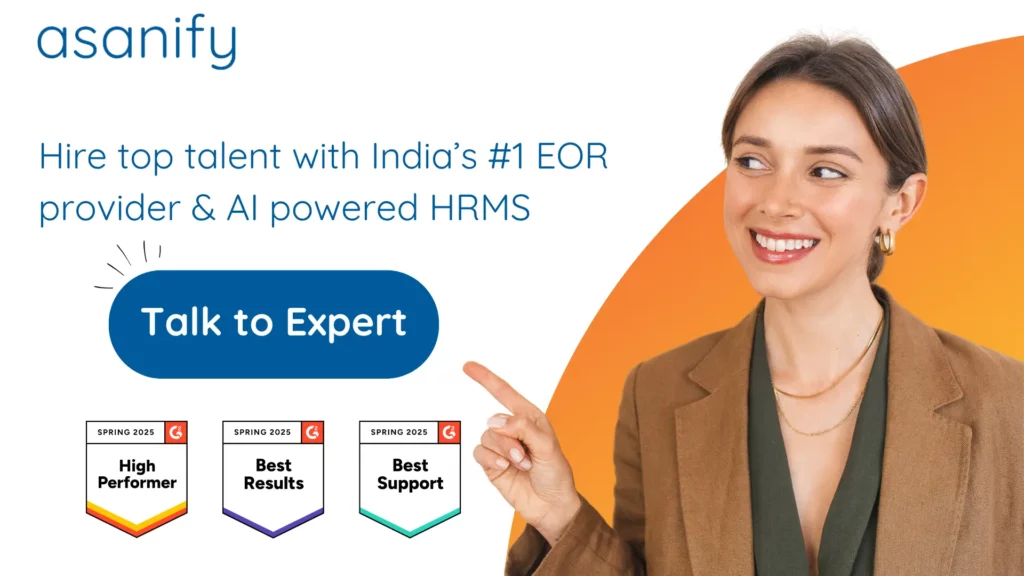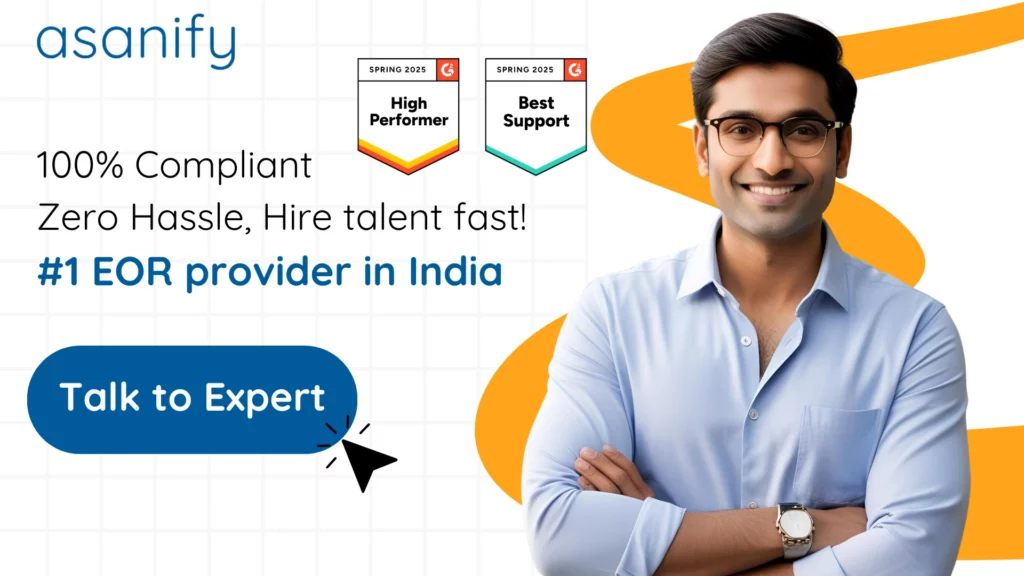In today’s cloud-first world, DevOps engineers are the backbone of efficient, scalable software delivery. As global tech companies increasingly embrace remote hiring, India stands out as one of the most cost-effective and talent-rich destinations for DevOps talent. With a massive pool of skilled engineers, competitive salary structures, and robust English fluency, it’s no surprise that more companies are looking to hire DevOps engineers in India to build high-performing teams in 2025. This comprehensive guide walks you through everything you need to know about hiring DevOps engineers from India—including skills, salary trends, legal compliance, and how Employer of Record (EOR) services like Asanify simplify the process.
Table of Contents
- Why Hire DevOps Engineers from India?
- Roles and Responsibilities of DevOps Engineers
- Salary Trends for DevOps Engineers in India (2025)
- Best Indian Cities to Hire From
- How to Hire DevOps Engineers in India
- Legal and Compliance Considerations
- Benefits Indian DevOps Engineers Expect
- Hiring Models Compared
- Why Use Asanify to Hire DevOps Engineers in India?
- Case in Point
- Conclusion
- FAQs
Why Hire DevOps Engineers from India?
India offers an unbeatable combination of talent availability, cost advantage, and timezone flexibility. Here’s why companies across the US, Europe, and Asia-Pacific are choosing Indian DevOps engineers:
- Large Talent Pool: India adds nearly 300,000 cloud-skilled engineers annually.
- Global Tech Exposure: Engineers often work on AWS, Azure, GCP, and Kubernetes from day one.
- Cost-Effective Hiring: Salaries are typically 60–70% lower than in the US or Western Europe.
- Time Zone Advantage: Perfect for round-the-clock DevOps operations or follow-the-sun deployment models.
- English Proficiency: Strong written and spoken communication skills ensure smooth async collaboration.
Roles and Responsibilities of DevOps Engineers
DevOps engineers bridge the gap between development and IT operations. Their goal is to automate, streamline, and accelerate the software delivery pipeline. Typical responsibilities include:
- Setting up and managing CI/CD pipelines
- Implementing Infrastructure as Code (IaC) with tools like Terraform and Ansible
- Monitoring application performance using tools like Prometheus and Grafana
- Ensuring security and compliance in production environments
- Managing containerized applications on Kubernetes or similar platforms
Popular tools: Git, Docker, Jenkins, Kubernetes, Terraform, Ansible, AWS/GCP/Azure, and ELK stack.
Salary Trends for DevOps Engineers in India (2025)
Salary is a critical consideration when hiring remotely. Here’s what you can expect to pay:
| Experience Level | Average Annual Salary (INR) | Approx. USD |
| Entry (0–2 yrs) | ₹6–9 lakhs | $7,000–11,000 |
| Mid (3–5 yrs) | ₹12–18 lakhs | $14,000–22,000 |
| Senior (6+ yrs) | ₹20–30 lakhs+ | $24,000–36,000+ |
Salaries vary based on city, skill set (e.g., AWS vs Azure), and certifications (like CKAD or AWS DevOps Pro).

Best Indian Cities to Hire From
India’s metro cities are hotbeds of DevOps activity. Here are the top locations:
- Bengaluru: Known as India’s Silicon Valley, top-tier DevOps talent and high competition.
- Hyderabad: Strong enterprise hiring, great for infrastructure and automation roles.
- Pune: Well-balanced tech ecosystem, ideal for startups and SMEs.
- Chennai: Deep expertise in telecom and industrial DevOps.
- Noida/Gurgaon: Fast-growing tech hubs with skilled engineers and better pricing.
Suggested Read: Hire Magento Developers in India: The Ultimate 2025 Guide
How to Hire DevOps Engineers in India
Hiring remote talent is different from traditional hiring. Here’s a 5-step roadmap:
- Define Your Needs: List tools, certifications, timezone coverage, and experience level.
- Choose a Hiring Model: Freelancers, outsourcing agencies, or Employer of Record (EOR).
- Source Talent: Use platforms like LinkedIn, GitHub, and Asanify’s vetted talent pool.
- Conduct Interviews: Focus on problem-solving, automation skills, and systems design.
- Onboard Compliantly: Use EOR to issue compliant employment contracts and manage benefits.
Legal and Compliance Considerations
India has strict labor regulations. Misclassifying employees as contractors can lead to fines and back taxes. Key compliance areas include:
- Provident Fund (PF): Mandatory 12% contribution by employer and employee.
- ESIC: Health insurance for low-salary brackets.
- Gratuity: Required after 5 years of service.
- TDS (Tax Deduction at Source): Employers must deduct and file taxes on behalf of employees.
Navigating these laws is complex if you don’t have a local entity—which is where EOR services come in.
Benefits Indian DevOps Engineers Expect
To attract and retain top-tier DevOps engineers in India, it’s essential to go beyond a competitive salary and provide a robust benefits package aligned with local standards and professional aspirations. Here are the key benefits Indian DevOps professionals typically expect—and that significantly impact job satisfaction and retention:
Comprehensive Health Insurance
Indian engineers value employer-sponsored health coverage not just for themselves, but also for their immediate family, including spouses, children, and sometimes parents. Offering comprehensive health insurance plans that cover hospitalization, OPD expenses, and preventive care is considered a standard and highly appreciated benefit.
Annual Performance Bonuses
While base salaries are important, performance-based incentives demonstrate a company’s recognition of individual contribution and motivate long-term commitment. Bonuses linked to key performance indicators (KPIs) or company growth milestones are widely expected in the Indian tech industry.
Remote Work Support
With remote and hybrid work models now commonplace, companies hiring DevOps engineers in India are expected to offer stipends or reimbursements for home office essentials. This includes high-performance laptops, internet bills, ergonomic furniture, and sometimes even electricity support for WFH productivity.
Generous Paid Time Off
Indian professionals generally expect a minimum of 21 days of paid leave annually, excluding public holidays. This may include casual leave, sick leave, and vacation days. Companies offering flexible leave policies that account for cultural and regional holidays tend to see higher employee satisfaction.
Learning and Development Allowance
DevOps engineers operate in a fast-evolving domain. Indian engineers greatly value employers who invest in their professional growth. This includes budgets for cloud certifications (e.g., AWS, Azure, GCP), DevOps tools training, access to online learning platforms, or reimbursement for attending tech conferences and workshops.
Offering these locally aligned benefits helps global companies not only attract top DevOps talent from India but also foster loyalty, boost engagement, and reduce attrition over the long term.

Hiring Models Compared
| Model | Pros | Cons |
| Freelancer | Quick to onboard | Lack of commitment, legal risks |
| Outsourcing Firm | Fully managed | Expensive, limited visibility |
| In-House Entity | Full control | Time-consuming, requires legal setup |
| Employer of Record (EOR) | Fast, compliant, cost-effective | May have monthly service fee |
Why Use Asanify to Hire DevOps Engineers in India?
Asanify is a trusted Employer of Record (EOR) platform built for fast-scaling global teams, enabling companies to legally hire remote DevOps engineers in India without setting up a local entity. With quick onboarding in just 7–10 business days, Asanify ensures end-to-end compliance across payroll, PF, ESIC, tax filings, and employment contracts. It also helps you offer localized benefits like medical insurance and perks Indian engineers expect, while simplifying payments through single-invoice billing in your local currency. By tapping into a pre-vetted talent pool of skilled DevOps professionals, companies can cut hiring costs by up to 60% and eliminate compliance challenges—building high-performing, global-ready DevOps teams with confidence.

Case in Point
A US-based SaaS startup needed to scale their DevOps team fast. Within 9 business days of contacting Asanify, they had onboarded 3 engineers from India—complete with employment contracts, benefits, and payroll setup. The engineers now support 24/7 CI/CD delivery across the US and APAC.
Suggested Read: Hire Manual Testers in India: A 2025 Guide
Conclusion
Hiring DevOps engineers in India is more than a cost-saving tactic—it’s a gateway to tapping into a mature tech ecosystem and a skilled talent pool capable of driving 24/7 global operations. However, simply recruiting isn’t enough. To succeed, companies must also navigate India’s complex employment regulations, tax structures, and employee benefit requirements.
That’s where an Employer of Record like Asanify steps in. Asanify ensures full legal compliance, handles payroll and statutory benefits, and provides locally compliant contracts—so your team can focus on deployment pipelines, not paperwork. With faster onboarding, simplified administration, and a compliant foundation, global companies can scale DevOps operations in India confidently and efficiently.
FAQs
Salaries range from ₹6 LPA for entry-level roles to ₹30+ LPA for senior professionals.
Yes—Asanify acts as the legal employer, ensuring 100% compliance through its EOR model.
Typically 7–10 business days from profile selection to onboarding.
Health insurance, performance bonuses, paid leave, and certification reimbursements are common.
Asanify takes care of contracts, payroll, tax filings, benefits, and even pre-vetted hiring.
Not to be considered as tax, legal, financial or HR advice. Regulations change over time so please consult a lawyer, accountant or Labour Law expert for specific guidance.



